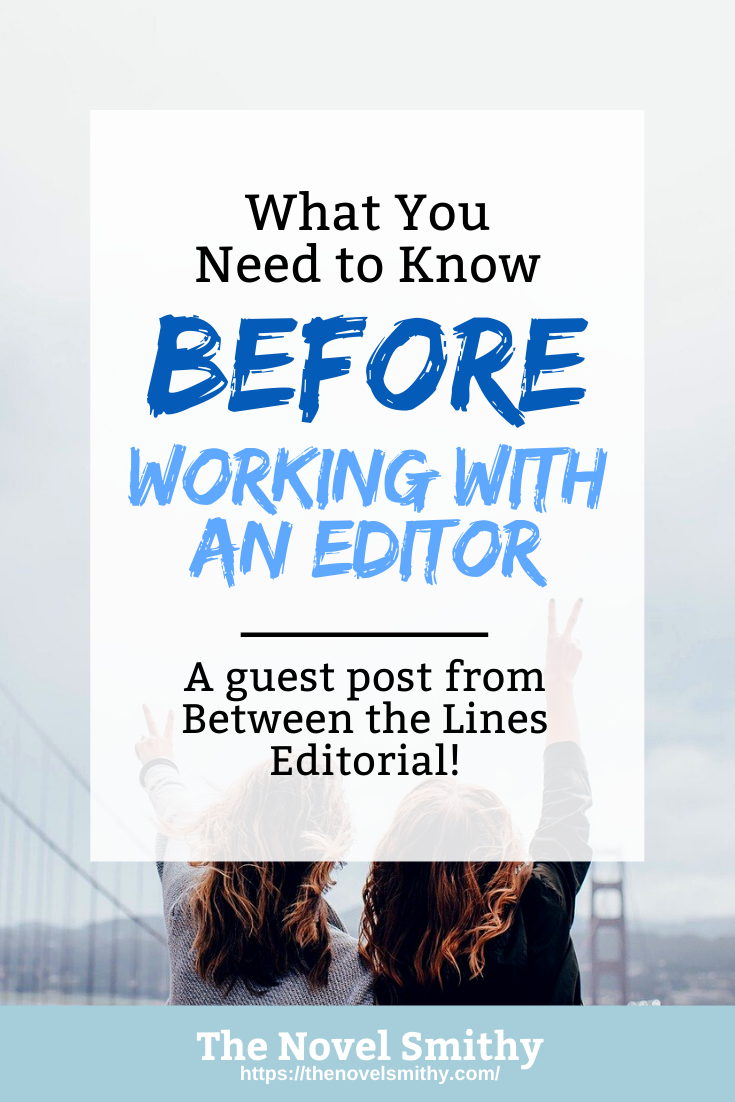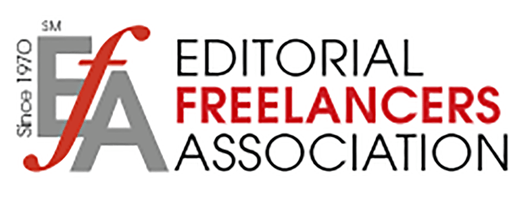What You Need to Know Before Working With an Editor
Working with an editor can be a mystifying experience.
That’s why this week we have a guest post on the blog, courtesy of Hannah Bauman from Between the Lines Editorial! Hannah is a professional editor herself, so she knows a thing or two about the professional editing process.
It’s hard to know what goes on behind the scenes and guess what your own experience may be when hiring an editor—but don’t worry. While working with an editor can be nerve-wracking the first time around, it’s actually a simple, fuss-free process with most editors.
_______________________________
Before we get into today’s post, I’d like to introduce you all to Hannah Bauman!
Hannah is a fellow author and editor who runs Between the Lines Editorial, where she helps writers of all types hone their craft and create professional quality novels. Make sure to go say hello, and check out the post I wrote for her site while you’re there: The 5 Lessons My Beta Readers Taught Me 🙂 – Lewis
_______________________________
Why You Should Work With an Editor
Contents
 Even writers with the greatest command of story and language work with editors.
Even writers with the greatest command of story and language work with editors.
You should too!
Editors are trained in story structure and the rules of language. Most editors have completed special training, whether that’s a graduate-level editing certification from a university, training programs organized by associations like the Editorial Freelancer’s Association, or continued self-study.
Having this trained, objective pair of eyes means editors will spot things beta readers and Microsoft Word’s proofing tool won’t. Editors know how to read between the lines and judge the nuance of the language choices you’re making as an author.
Perhaps more importantly, editors can teach you something about the writing craft.
I believe every author should walk away from the editorial process with at least one new piece of knowledge. For example, if you have a problem with “show vs. tell,” an editor can help you understand how to avoid this in future drafts or how to self-edit it out of your manuscripts.
All of this time they spend learning the ins and outs of story and language can help your story be the best version possible.
Where to Find an Editor
Where you find an editor will depend on your own needs and publishing goals.
If you want to hire a freelance editor, either because you’re self-publishing or because you want the extra help, check out social media and professional organizations in your country. There are editors out there from various backgrounds with a wide range of skills and price points. You can find someone who fits what you’re looking for.
If you’re going to query agents and hope to sell your manuscript to a publisher, your future publisher will provide an editor for you. However, you may decide you want to work with a freelancer first. That’s a personal choice. If you still decide to hire a freelancer, you can also check out social media and professional organizations.
How the Editing Process Works
The editing process will vary from editor to editor and based on the type of editing you’re looking for.
There are a few things you can likely expect, though.
For developmental editing—story editing that covers the structural parts of your book like character, plot, et cetera—your editor will evaluate the various structural parts of your manuscript. They’ll use the comments feature in your document to ask questions, leave suggestions, and point out what’s not working.
For language editing—like copyediting or proofreading—your editor will likely use Track Changes to suggest changes that you can then accept or reject. Most editors won’t edit for the sake of editing, and you can trust their judgment, but it’s still best to review the suggestions and make sure your meaning wasn’t lost in the process.
Once your editor finishes their work, they’ll send your manuscript back to you along with notes. While I can’t speak for every editor, most editors welcome questions from you as you start to revise your work.
Editors Won’t Change Your Voice
An editor shouldn’t change your voice—unless you’ve asked for help developing this part of your writing.
When an editor suggests changes, whether they’re about structure or language, they’re exactly that: suggestions. Yes, some things may be necessary, like a period at the end of a sentence, but overall, the editor’s goal is to make your communication clear to readers.
That’s why you may come across things that aren’t grammatically correct, like sentence fragments. Editors know, just like authors, that these can be used purposefully and aren’t simply “wrong.”
That same goes with your voice.
Your editor will make suggestions to keep your language clear and engaging, but they will do so in a way that fits your unique style. And at the end of the day, you have the final say on what changes in your book and what doesn’t.
Making the Most of Working with an Editor
Hiring and working with an editor can be scary, even if you’ve gone through the process a few times. Here are seven things to keep in mind as you begin the editorial process:
#1: Don’t feel like your manuscript has to be “perfect” when you send it to your editor. They aren’t expecting perfection, and it’s literally their job to help you!
#2: Don’t work on your manuscript after sending it to your editor. Consider this time a vacation from your novel.
#3: Your editor is on your team, and they want to see you succeed!
#4: Handing over your manuscript to anyone is a vulnerable act. Your editor knows this, and they should help you feel comfortable and secure.
#5: If your editor makes a typo, it’s not because they’re bad at their job—although repetitive, consistent errors may be a red flag. Editors are human, too.
#6: If you get your manuscript back with many more changes than you anticipated, trust the process and keep an open mind. Your editor has their reasons for all of those edits.
#7: Be patient and remember what you’re working toward. Getting a book ready for publication is inherently slow because of the painstaking work that goes into production, including edits.
Remember, editing is part of the process.
Every writer goes through this stage, and though it may be time consuming and frustrating some days, you’re making your book the best version it can be!
Do you have any questions about working with an editor? Let me know in the comments!

Hannah Bauman
Hannah Bauman, founder of Between the Lines Editorial, is an editor and publishing consultant who helps writers tell their unique stories. When she isn’t working with her clients or blogging, you can find her sipping iced coffee, playing tennis, or playing video games.
You can learn more about Hannah’s work on her website or Instagram.



Leave a Reply